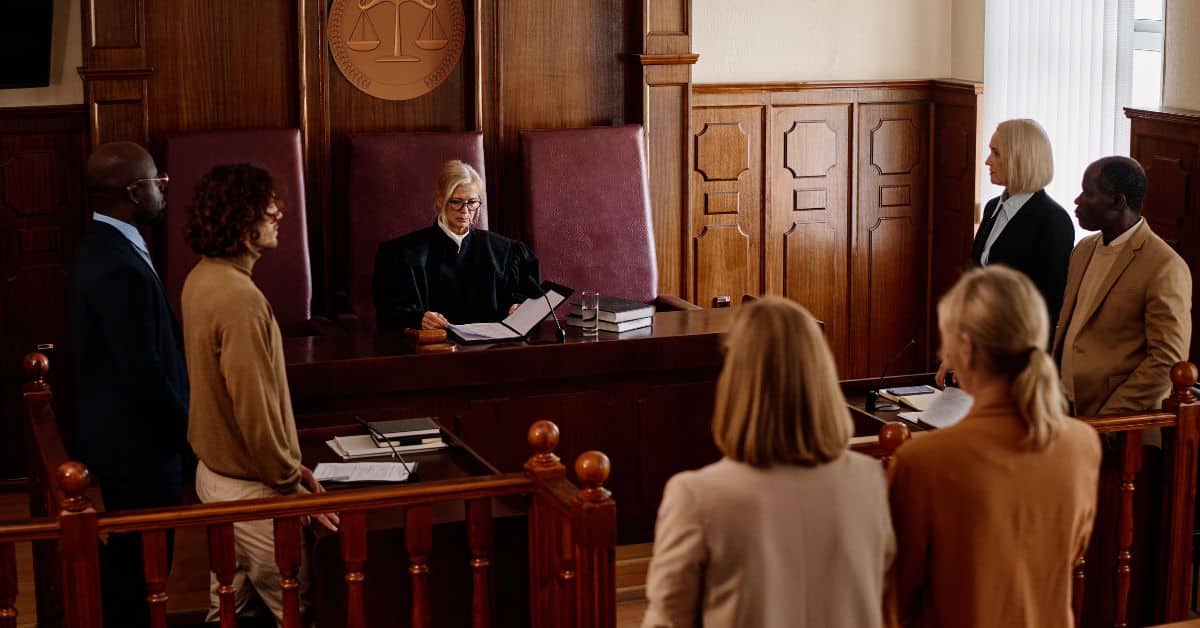Navigating a workers comp hearing can be daunting. The process is often complex and filled with legal jargon.
This guide aims to demystify the workers’ comp hearing process. It provides practical tips and insights to help you prepare effectively.
We’ll dive into the role of the workers’ comp judge and their decision-making process. Understanding this can help you present your case more effectively.
We’ll also discuss the types of evidence that can support your claim. This includes how to present your testimony effectively at the hearing as well as some key workers’ comp hearing tips
Whether you’re preparing for your first workers’ comp hearing or seeking to understand the process better, this guide is for you.
By the end of this article, you’ll have a clearer understanding of what to expect at a workers’ comp hearing and how to prepare for it.

Understanding the Workers’ Comp Hearing Process
A workers’ comp hearing is a legal proceeding. It’s where disputes over workers’ compensation claims are resolved. The process varies by state, but there are common elements.
The hearing is presided over by a workers’ comp judge. Both the employee and the employer, or their representatives, present their case. This includes evidence and testimonies. The judge then makes a decision based on the presented facts and applicable laws. Understanding this process can help you prepare effectively for your hearing.
Preparing for Your First Workers’ Comp Hearing
Your first workers’ comp hearing can be daunting. But with proper preparation, you can navigate it confidently. Start by understanding the specific workers’ comp laws in your state. This will help you know your rights and responsibilities.
Gather all relevant documents and evidence. This includes medical records, accident reports, and witness statements. Organize them in a way that supports your claim.
Here are some tips to help you prepare:
- Review your case thoroughly with your attorney.
- Prepare your testimony. Be ready to answer questions about your injury and how it has affected your work.
- Understand the role of the workers’ comp judge and how decisions are made.
- Be ready to present your evidence effectively.
Remember, the goal is to present a clear and compelling case. This will increase your chances of a favorable outcome.
The Role of the Workers’ Comp Judge
The workers’ comp judge plays a crucial role in your hearing. They are responsible for reviewing all the evidence and making a decision on your claim. This decision is based on the facts of the case, the law, and their judgment.
The judge will listen to your testimony, review your medical records, and consider any other relevant evidence. They will also consider the testimony of any witnesses. It’s important to understand that the judge’s decision is not personal. It’s based on the evidence and the law. So, present your case clearly and honestly.
Evidence That Supports Your Claim
When it comes to a workers’ comp hearing, evidence is key. The more solid evidence you have to support your claim, the better your chances of a favorable outcome. This evidence can take many forms.
Medical records are often the most important evidence in a workers’ comp case. These can include doctor’s reports, test results, and treatment plans. They provide a clear picture of your injury and its impact on your ability to work.
Other forms of evidence can include witness testimonies, photos of the accident scene, and any relevant documents. Remember, the goal is to build a strong, convincing case.

Presenting Your Testimony Effectively
Presenting your testimony at a workers’ comp hearing can be nerve-wracking. However, with proper preparation, you can present your case effectively. The key is to be clear, concise, and honest in your statements.
Your testimony should focus on the facts of your case. Discuss the incident, your injuries, and how they have affected your ability to work. Remember, consistency is crucial. Any discrepancies in your statements can harm your credibility.
Lastly, maintain a calm and respectful demeanor throughout your testimony. This not only shows professionalism but also helps in keeping the focus on the facts of your case.
What Happens at a Workers’ Comp Hearing?
During a workers’ comp hearing, you’ll present your case before a workers’ comp judge. The judge will listen to your testimony, review the evidence, and hear arguments from both sides. It’s a formal process, but not as rigid as a traditional court hearing.
The employer or their insurance company will also have a chance to present their side. They may dispute your claim or present evidence to challenge your testimony. This could include surveillance footage or medical reports.
After all the evidence and testimonies are presented, the judge will make a decision. This decision may not be immediate. In some cases, the judge may take several weeks to review the case before making a final decision.
Remember, each hearing is unique. The process can vary depending on the complexity of the case, the judge, and the laws in your state.

Potential Outcomes and Judge’s Decisions
The judge’s decision at a workers’ comp hearing can have several outcomes. They may fully approve your claim, awarding you the benefits you’re seeking. Alternatively, they may deny your claim if they believe the evidence doesn’t support it.
In some cases, the judge may approve part of your claim and deny other parts. For instance, they might agree that your injury is work-related but disagree with the extent of your disability.
The judge’s decision is based on the evidence presented, the testimony given, and the specific workers’ comp laws in your state.
After the Hearing: Next Steps
Once the workers’ comp hearing concludes, you’ll need to wait for the judge’s written decision. This can take several weeks, depending on the complexity of your case and the judge’s caseload. It’s crucial to remain patient during this period.
If the decision is in your favor, you’ll start receiving your benefits as outlined in the decision.
However, if the decision is not in your favor, you have the right to appeal. It’s important to consult with your attorney to understand the appeals process and the deadlines involved.
Remember, the workers’ comp hearing is a significant step, but it’s not always the final one. Depending on the outcome, you may need to prepare for further legal proceedings.
Tips for a Successful Workers’ Comp Hearing
A successful workers’ comp hearing requires preparation, understanding, and patience. Here are some key tips to help you navigate the process:
- Understand the workers’ comp laws in your state.
- Prepare your testimony and evidence thoroughly.
- Be honest and consistent in your statements.
- Maintain a professional demeanor during the hearing.
- Consult with a workers’ comp attorney for guidance.
Remember, every workers’ comp case is unique. What works for one person may not work for another. It’s important to tailor your approach to your specific circumstances.
Conclusion
At MHK Attorneys, we understand the challenges of navigating a workers’ comp hearing. With our expertise and dedication, we can help you effectively present your case and secure your rights and benefits as a worker.
Don’t face the hearing alone. Contact us today for personalized guidance and support. Remember, your future is worth fighting for. Contact us now.